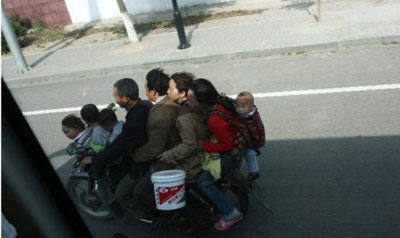管理员

Hailing from puritanical America, I used to believe that certain things in life, like defecation, were sacred and, past a certain age, to only be done in private. I thought that this was a commonsense, universal belief, until an eye-opening experience I had during my first extended stay in China. One day I was followed into a restroom which lacked cubicle doors by my Chinese friend. After I entered one of the cubicles and started doing my thing, my friend stood in front of me and began chatting. I looked up at her horrified, but she continued yapping away as if we were sat across from each other in a coffee shop and it was the most normal thing in the world. As I screamed in my head, "What the hell are you doing? Go away!" It dawned on me that to her it was the most normal thing in the world.
The lesson I learned that day is that privacy is a luxury. When you have over 1.3 billion people, separating toilets into cubicles with doors and providing universities with more dormitories so students do not have to sleep five to a room, are just not that high on your priority list. Clearly China was not going to change for me, so I decided to change for it.
Another facet of foreign life in China which challenges my comfort zone is the staring; foreigners in China get stared at all the time. Admittedly in Beijing, the attention paid to foreigners is less than in second and third tier cities where foreigners are often approached for photographs, but being subject to unabashed stares is still a daily occurrence for us Beijing "laowai". To ease the feeling of being a cell under a microscope I simply pretend that I am Madonna, and the starers are my fans who are afraid to approach me for an autograph because of my fierce nature.
I have also had to adjust my views about the way things should be during visits to Chinese hospitals. In Beijing a doctor's office usually contains at least three desks along with a line of patients. Once it is a patient's turn, they sit at the doctor's desk and tell them about their ailment, all within earshot of at least 10 strangers.
Last year I stood in a line 30 people deep to have my blood drawn. When I first joined the cue I let out several exasperated sighs to show my annoyance at the situation, but I quickly shut up when I saw how fast the line moved. Dongzhimen hospital draws blood with remarkable efficiency. Patients first visit a reception window and collect a glass vial labeled with their name, and then they join a line of people clutching their glass vials. Once patients reach the glass window at the front of the line they hand the vial over, stick out their arm, and have their blood drawn in under thirty seconds.
Once I learned to embrace China's differences they began to take on an air of normality. Trying on clothes in a small stall behind a flimsy curtain, witnessing three people sharing one moped, and watching toddlers pee on the street through a slit in their pants no longer phase me. Of course China's methods are not without their flaws. In one of my few China hospital experiences I witnessed a fist fight almost break out between a hospital worker and a patient who was desperate for her turn. She had clearly missed the memo about the 1.3 billion people.
Image: chinaSMACK
